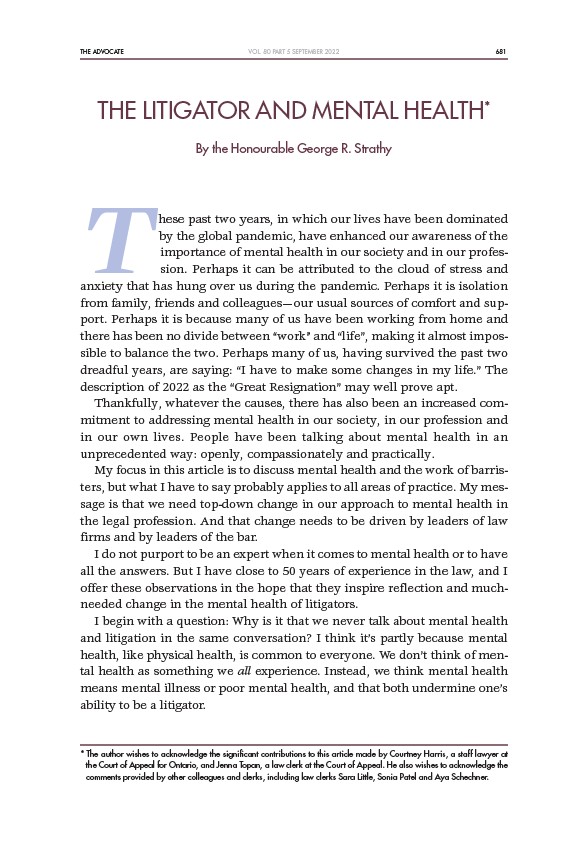
THE ADVOCATE 681
VOL. 80 PART 5 SEPTEMBER 2022
THE LITIGATOR AND MENTAL HEALTH*
By the Honourable George R. Strathy
T hese past two years, in which our lives have been dominated
by the global pandemic, have enhanced our awareness of the
importance of mental health in our society and in our profes-
sion. Perhaps it can be attributed to the cloud of stress and
anxiety that has hung over us during the pandemic. Perhaps it is isolation
from family, friends and colleagues—our usual sources of comfort and support.
Perhaps it is because many of us have been working from home and
there has been no divide between “work” and “life”, making it almost impossible
to balance the two. Perhaps many of us, having survived the past two
dreadful years, are saying: “I have to make some changes in my life.” The
description of 2022 as the “Great Resignation” may well prove apt.
Thankfully, whatever the causes, there has also been an increased commitment
to addressing mental health in our society, in our profession and
in our own lives. People have been talking about mental health in an
unprecedented way: openly, compassionately and practically.
My focus in this article is to discuss mental health and the work of barristers,
but what I have to say probably applies to all areas of practice. My message
is that we need top-down change in our approach to mental health in
the legal profession. And that change needs to be driven by leaders of law
firms and by leaders of the bar.
I do not purport to be an expert when it comes to mental health or to have
all the answers. But I have close to 50 years of experience in the law, and I
offer these observations in the hope that they inspire reflection and muchneeded
change in the mental health of litigators.
I begin with a question: Why is it that we never talk about mental health
and litigation in the same conversation? I think it’s partly because mental
health, like physical health, is common to everyone. We don’t think of mental
health as something we all experience. Instead, we think mental health
means mental illness or poor mental health, and that both undermine one’s
ability to be a litigator.
* The author wishes to acknowledge the significant contributions to this article made by Courtney Harris, a staff lawyer at
the Court of Appeal for Ontario, and Jenna Topan, a law clerk at the Court of Appeal. He also wishes to acknowledge the
comments provided by other colleagues and clerks, including law clerks Sara Little, Sonia Patel and Aya Schechner.